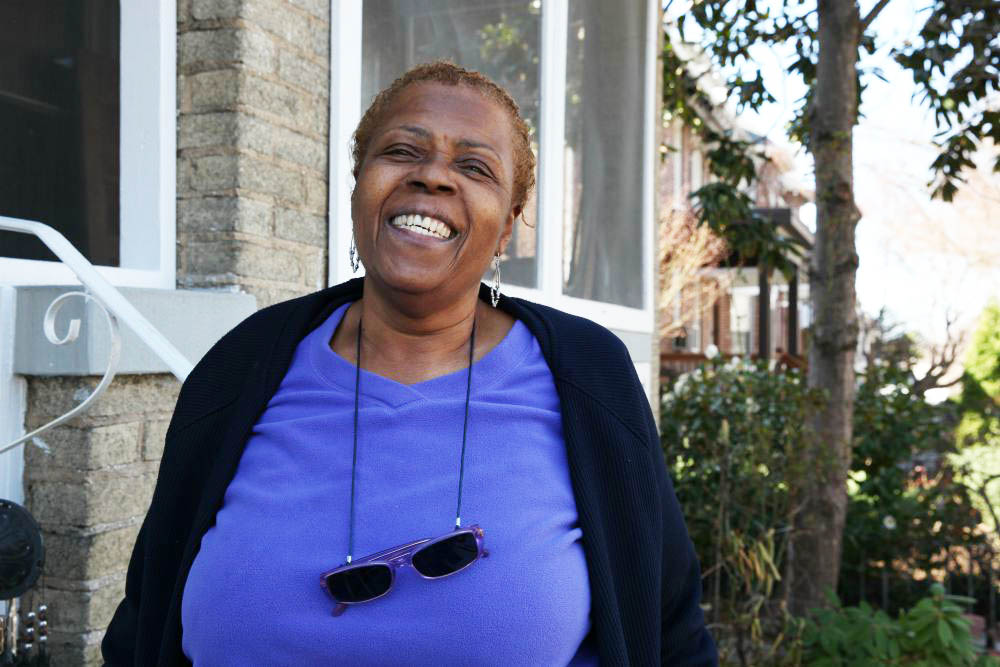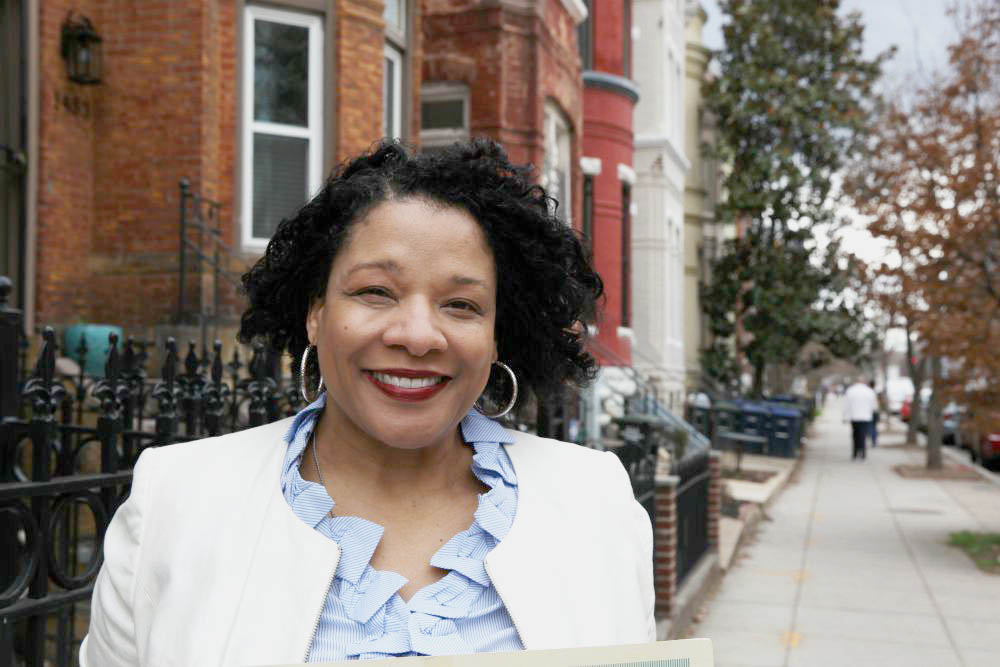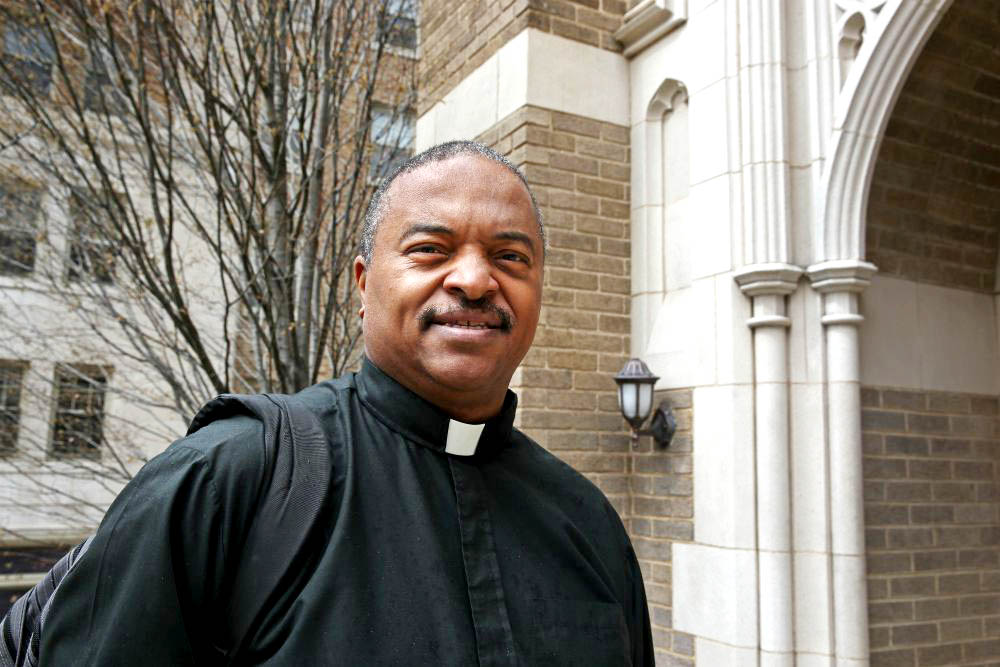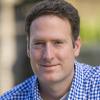
Kya Ebuwei carries a cross during a Good Friday service of St. Augustine Catholic Church in Washington, D.C., March 2. (Rick Reinhard)
When the streets around St. Augustine Catholic Church filled with tear gas and National Guard troops after Rev. Martin Luther King's assassination 50 years ago this week, Sr. Barbara Spears didn't flee the chaos or stay in the convent.
"I remember everyone was leaving Washington because the city was on fire," recalled the 77-year-old Sister of the Holy Names of Jesus and Mary and a former principal at the church's school. "I wanted to be present to our community. People were angry and fighting violence with violence, but they had respect for the church."
A half century later, St. Augustine remains a reference point for reflecting on the tumultuous days that followed King's murder, and a touchstone for examining the unfinished work of the civil rights movement in a city where race, class and demographic changes are fraught topics.
The story of St. Augustine isn't simply about a single church. The struggles and success of this remarkable parish are also part of a larger, unfolding narrative that underscores the Catholic Church's role in both perpetuating and responding to institutional racism.
Founded in 1858 and built in part by emancipated slaves, St. Augustine has a distinguished history. It opened the District's first school for black children, staffed by the Oblate Sisters of Providence, the oldest religious order of black women in the United States. President Abraham Lincoln held a "strawberry festival" fundraiser on White House grounds to help support the church.
The church hosted the first National Black Catholic Congress in 1889, which drew African American Catholics from across the country. A delegation at the meeting met with President Grover Cleveland.
Advertisement
St. Augustine housed people traveling in for the 1963 March on Washington, which coincidentally took place Aug. 28, the Feast of St. Augustine, and the parish played a leading role in coordinating Catholic participation in the event. After looting and violence broke out after King's assassination on April 4, 1968, Catholic clergy, nuns and parishioners from St. Augustine found themselves at the epicenter of the unrest.
Fr. Raymond Kemp had been ordained a priest for less than a year and just started his ministry at St. Augustine when the 27-year-old heard the news that King had been gunned down at the Lorraine Motel in Memphis, Tennessee. Despite warnings from some in the community who feared for his safety, Kemp put on his clerical collar and walked the streets helping to deliver food, water and other supplies to people afraid to leave their houses.
He described himself in those days as being "a Red Cross worker in a disaster zone."
After the smoke settled and emergency curfews ended, the slaying became a catalyst for activism and a deeper level of community organizing. "Black folks had this real sense that they were not going to take this anymore," said Kemp, who is white and served at the church for more than a decade.
St. Augustine Catholic Church is near newer condominiums in Washington, D.C. (Rick Reinhard)
"I realized we couldn't wait for people to come to us. We had to go out to the community." The priest, now 77, was elected to a seat on the city's school board four years after the assassination and still remains well-connected in Washington's political and civic circles. He passes social justice lessons on at Georgetown University, where his popular class, "The Church and The Poor," helps students make sense of the Catholic social tradition by providing real life exposure to leading activists, civil rights attorneys and other community leaders in Washington.
While Kemp is energized by Black Lives Matter activists and young people taking on the National Rifle Association, he wants to see more from a new generation of church leaders.
"When are we going to have truth and reconciliation in the Catholic Church?" Kemp asks, referencing the pioneering model used in South Africa to address the spiritual and physical wounds of apartheid. "How can we rebuild our communities when we can't tell the truth to each other about racism?"
In the years following the riots, when the U Street, Shaw and Cardozo neighborhoods reeled under lack of investment, white flight and the later rise of crack cocaine in the 1980s, St. Augustine became a hub for neighborhood services and social activism.
In partnership with other local churches, schools and community centers, there was organizing to help public housing residents access fresh groceries and after school programs, and there were efforts to ensure low-income families had greater access to health care.
A legendary activist priest, the late Fr. Geno Baroni, started a flurry of community projects throughout the 1960s, including a credit union for the church. It caught the attention of President Lyndon Johnson. As his administration put together a package of War on Poverty policies, federal officials came to see credit unions such as the one at St. Augustine as a successful approach and included the model in its landmark Great Society programs.
Baroni had established himself as a leading Catholic figure in the civil rights movement, marching with King in Selma, Alabama. He had the support of Cardinal Patrick O'Boyle, who led the Archdiocese of Washington, D.C., for more than two decades beginning in 1948. O'Boyle desegregated Washington churches and parochial schools three years before the 1954 Supreme Court ruling outlawed school segregation.
Baroni would lead the Washington Archdiocese's urban affairs office and later serve in the Carter administration's Department of Housing and Urban Development. Baroni's legacy set a high bar for contemporary faith-based activists at St. Augustine who continue to carry on a social gospel tradition as the nation's capital confronts new challenges.

Carolyn Matthews is a longtime St. Augustine parishioner who lives near the church. (Rick Reinhard)
The Gothic spires of the church, at the corner of 15th and V St. in northwest Washington, now share a vista with glass-enclosed luxury condominiums. Neighborhoods that went up in flames are now lined with trendy restaurants, boutique salons and bars. While the changes are a boon to developers and largely white young professionals who can afford an upscale version of urban life, many African American families were pushed out during waves of gentrification that continue to transform the look and feel of a town once dubbed "Chocolate City" for its majority African American population. Washington's black population slipped below 50 percent for the first time in 2011.
Carolyn Matthews, 69, a longtime St. Augustine parishioner who lives near the church, points to the persistence of racism from King's assassination until today as the prism to understand the shift. "There was a time when many affluent African Americans lived in the city," Matthews said. "Gentrification is just another means of getting us out of the city. It's unconscionable and disgraceful that developers now control what happens in these neighborhoods."
A 20-year-old medical specialist at Ft. Belvoir in Virginia when the civil rights hero was slain, Matthews remembers that day as a wakeup call. "It brought racism to the forefront for me. I didn't really understand discrimination or racism because our father protected us." An enduring challenge, she thinks, is for the Catholic Church to address what role it plays in the legacy of inequality.
"The church needs to acknowledge its own in-house racism," she said. "It's still not a level playing field."
While Pope Gregory XVI condemned the slave trade as "inhuman" and "unworthy of the Christian name" in an 1839 apostolic letter, U.S. bishops and religious congregations owned slaves. Georgetown University, founded by Jesuit priests, sold 272 of their slaves to help stabilize the financial footing of the college. No American seminary would accept Augustus Tolton, the first black Catholic priest, so he went to Rome for studies. Of the 284 active bishops in the United States today, only nine are black.

Members of St. Augustine parish stop to pray during a Good Friday service March 2. (Rick Reinhard)
Cardinal Donald Wuerl, the current archbishop of Washington, released a pastoral letter last November condemning "the persistent evil of racism" and acknowledging that "the divisive force of this sin continues to be felt across our land in our society."
Matthews appreciates the cardinal's gesture but says more is needed. "It's one thing to put out chest-beating statements about racism," she said, "but it doesn't adequately address the issue of racism in the church. We African Americans built St. Augustine from the sweat of our brow."
On Palm Sunday, a day after hundreds of thousands rallied in D.C. and across the country for tighter gun legislation, the church is packed. Ushers are dressed in sharp suits with red ties and white gloves. The matriarchs of the church sport colorful hats. The gospel choir brings people to their feet with soaring hymns. Fr. Patrick Smith has the congregation riveted on his words.
"I woke up this morning with sore legs," the pastor says in a slow cadence, "But it was a good kind of sore."
Smith attended the March for Our Lives, carrying a small sign with a simple message dedicated to someone he knew who died from gun violence just two weeks earlier. "Suffering and pain gives you credibility, and that's why people are listening to these young people," he says about the Parkland, Florida, student activists.
But the pastor has a deeper point to drive home about sacrifice on this start of Holy Week, when the Gospel reading is focused on Jesus' suffering and crucifixion.
"Before there was a March on Washington, before there were marches in India against the British Empire, before the marches in Soweto, there was Jesus' march up to Calvary," he tells the congregation.
Smith grew up in the District, a Catholic school kid from a big family. He was only five when King was killed. But while attending seminary and studying theology in Rome, the priest wrote his thesis on King's use of non-violence. For Smith, one of King's most important insights was his insistence that Christian churches fail the Gospel when they merely reflect societal norms rather than challenge injustice. It's why Smith takes on topics in his sermons that are not always comfortable: white supremacists rallying in Charlottesville, police brutality, nativism.

Angela Wilson-Turnbull directs social justice efforts at St. Augustine parish. (Rick Reinhard)
"The church still needs to be a voice for justice, particularly racial justice," Smith said during an interview in his office. "That's as relevant today as it was a century ago."
On a recent Sunday after Mass, Angela Wilson-Turnbull, who directs social justice efforts at the parish, leads a strategy session at a restaurant around the corner from the church. Over coffee and sandwiches, the group plans out upcoming actions.
Along with other congregations that are part of the Washington Interfaith Network, activists from St. Augustine prepare for a meeting with candidates running for city council. The goal is to get them on record to support the city purchase of vacant lots that can be turned into affordable housing units. The advocates from the church will also pressure the candidates to secure more funding for legal representation of immigrants with Temporary Protected Status (TPS), a humanitarian program that the Trump administration is ending for several countries, including El Salvador. The D.C. region has the highest percentage of Salvadoran immigrants in the country.
Wilson-Turnbull has been attending St. Augustine for more than three decades. King's legacy of reaching across racial and religious lines to create change inspires her. "He gives me the courage to speak out and take risks," she said. "We have an obligation to stand in the gap and do the hard work others don't want to do."
The church's social justice team played a visible role in pressing Mayor Muriel Bowser to close D.C. General, the city's notoriously overcrowded and dilapidated homeless shelter. Parishioners at the church interviewed more than 200 families at the shelter, met with all of the mayoral candidates and held a press conference.
St. Augustine's advocacy efforts were also critical in securing $100 million for the city's Housing Production Trust Fund in 2015, a major victory for low-incoming housing in a city where soaring rents and mortgages leave many working families and seniors priced out of the market. The church is planning a welcome celebration for tenants returning to refurbished units at Portner Flats, an affordable housing development on the same block as St. Augustine.
The Washington Archdiocese has recognized the church as a leader in social justice and community organizing. For the third year in a row, St. Augustine will lead trainings for Catholic justice leaders from dioceses around the country.
A group of parishioners from St. Augustine traveled to Modesto, California, last winter to participate in a World Meeting of Popular Movements event, created by Pope Francis to bring together grassroots activists working for social change. The Washington Archdiocese gave approval to St. Augustine to host a local version of the meeting this fall.
"There is so much written about the social justice teachings of the Catholic Church," Wilson-Turnbull said. "But we're committed in our ministries to making sure that tradition is lived out and touches people's lives."
Race and religion in the Trump era
Any conversation about racial justice and the Catholic Church can't avoid grappling with the jarring reality that the nation's first African-American president was followed by a political leader who has emboldened white supremacists and incites fear in communities of color.
While most media coverage has focused on white evangelical support for Trump, more than 50 percent of white Catholics voted for the president. St. Augustine doesn't shy away from the topic. A series of teach-ins sponsored by the church, "The Trump Administration vs. Catholic Social Teaching," meets at a Busboys and Poets restaurant and bookstore, a popular local gathering place for organizers and activists named after the poet Langston Hughes. Topics have included the role of the black church in the Trump era and how the administration has challenged access to affordable health care. District council members, St. Augustine parishioners and Daughter of Charity Sr. Carol Keehan, CEO of the Catholic Health Association, have participated as panelists.

Fr. Patrick Smith is pastor of St. Augustine parish in Washington, D.C. (Rick Reinhard)
Broderick Johnson, a prominent lobbyist and lawyer who served in the Obama administration, watches the resurgence of racism and white backlash politics with unease.
A St. Augustine parishioner for more than 20 years, Johnson served as the chairperson of the president's My Brother's Keeper taskforce, which focused on addressing persistent opportunity gaps faced by boys and young men of color. The effort still continues as part of the president's foundation.
"I know for my sons and other young black men the challenges are still there," Johnson said.
A major new study that tracked millions of children, conducted by researchers at Stanford University, Harvard University and the Census bureau, found that black boys who grew up in the wealthiest families still earn less in adulthood than white children from similar backgrounds. These gaps persisted even when black and white boys grew up in families with the same income, similar family structures, similar education levels and even similar levels of accumulated wealth.
For Johnson, 61, an accomplished professional who attended elite universities, served a president and had the opportunity to meet Pope Francis at the White House, this sobering data confirms what he sees in board rooms and in the halls of power in Washington.
"I'm often one of the few African Americans or the only African American in the room," he said. "We know there has been incredible progress made on race, but the data is what it is."
Martin Luther King would never have been able to sustain his struggle, Johnson knows, without faith. It's also what keeps Johnson from despairing.
"King's life symbolizes for me that direct connection between justice and what makes me a Catholic," he said. "We have to continue to fight.
[John Gehring is Catholic program director at Faith in Public Life, and author of The Francis Effect: A Radical Pope's Challenge to the American Catholic Church.]






